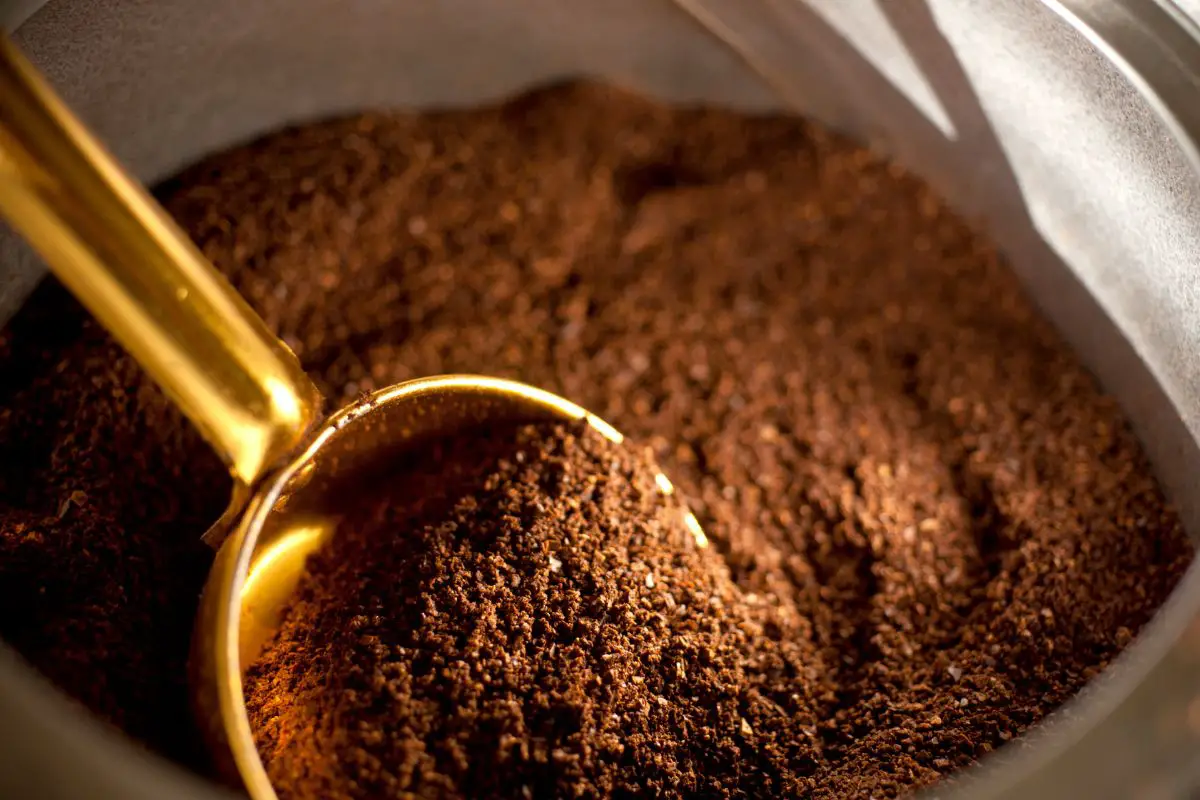The internet is brimming with easy and quick gardening hacks that promise to make flowers and plants as healthy as possible. While some people can swear by these hacks, others consider them myths. Among them is the use of coffee grounds for roses. Are coffee grounds good for roses? This article will explore everything you need to know about coffee grounds and roses. Read on!

Are Coffee Grounds Good for Roses?
Yes, coffee grounds are good for roses. Adding coffee grounds to your roses helps fertilize the soil. However, coffee grounds need to be used correctly to reap positive benefits. Therefore, we’ll discuss the benefits of using coffee grounds for your roses and how to correctly use coffee grounds. Let’s get started!
Benefits of Coffee Grounds for Roses
Coffee Grounds contain Nutrients
Coffee grounds contain nutrients such as nitrogen, potassium, and phosphorus that are ideal for the growth of healthy roses. Nitrogen is the most essential nutrient that’s required in large amounts by roses for the growth of new leaves and stems. On the other hand, potassium and phosphorus are valuable to roses since they improve soil health. Therefore, you can use coffee grounds to add more nutrients to the soil and roses.
Coffee Grounds Improve Soil Drainage
Adding coffee grounds to roses improves the soil structure by attracting healthy worms such as earthworms that break down organic materials in the soil. Additionally, the worms attracted by coffee grounds help improve soil drainage by creating channels in the soil. With good soil drainage, the rose roots cannot rot as a result of too much water. Also, the worm casts created by the worms provide nutrients and minerals to the soil and the rose roots. The casts and tunnels also allow the rose roots to penetrate deeper into the soil, thus giving the rose plant more stability, moisture, and nutrients that are necessary for a healthy and drought-resistant rose.
Coffee Grounds Are Ideal for Mulching
Coffee grounds are ideal for compost since they help in the fast decomposition of organic materials by attracting healthy worms to the compost. The compost materials can be used as mulch for your roses or added to the roses’ soil or other plants in the garden for more nutrients. When the organic materials are broken, rose roots can easily take them in. Additionally, the organic material that’s broken down can absorb water, hold onto it, and yet allow excess water to drain freely. This is perfect for roses since they thrive under well-drained soil that can still hold onto water so that roots can absorb it when needed, without being saturated.
Coffee Grounds Ensure Right Soil Acidity
Roses grow best in soil acidity that ranges from 6 to 6.8 PH. On the other hand, coffee grounds contain acid that varies depending on the type of coffee bean used. When coffee grounds are added to the soil, they add to the soil’s acidity thus contributing to the growth of roses. However, ensure that you check your soil’s acidity using a PH soil tester before adding coffee grounds to your roses.
Coffee can Be Used to Ward Off Pests and Pets
Coffee grounds can be used in your garden to ward off unwanted pets and pests. They serve the purpose of pesticides and insecticides that are harmful chemicals. High amounts of coffee can help keep off slugs from your garden since caffeine is harmful to these creatures. Additionally, you can keep off cats from your roses using coffee grounds. Cats may be destructive as they can dig up your roses when scavenging for food. Cats hate the smell of coffee grounds they won’t go near the garden.
When to Use Coffee Grounds for Roses
Nitrogen is an essential nutrient in coffee grounds that helps in the growth of leaves and stems of roses. It’s important to know when to use coffee grounds for roses since using them late in the season may lead to the development of fragile rose leaves that cannot withstand winter frosts.
The ideal time to use coffee grounds for your roses is at the beginning of the rose’s growing season (spring). During this period, the rose is emerging from winter dormancy and the new leaves are almost open. Most importantly, don’t use coffee grounds on roses towards the end of summer since the new roses need time to harden so that they can prepare for winter frosts. Applying coffee grounds on roses at the end of summer leads to black roses and delicate leaves that are destroyed in the first winter frost.
Furthermore, the beginning of spring is when weeds start to grow around the roses. Using compost that’s made with coffee grounds will suppress the weed’s growth and provide adequate nutrients essential for the growth of your roses.
How to Use Coffee Grounds for Roses

As mentioned earlier, coffee grounds are beneficial to roses as a result of nitrogen, a nutrient that can be used as fertilizer for the plants. However, you should use coffee grounds in moderation since too much nitrogen can burn the plant roots. Here are several effective ways to use coffee grounds on roses.
- Sprinkle coffee grounds around a mature rose plant
Sprinkle about 500 grams of coffee grounds around mature rose plants and water the roses with 2 gallons of water. This way, you’ll provide the roses with the nitrogen they need without harming the roots. You don’t have to dig the coffee grounds into the soil since this may ruin the soil structure as well as disturb the plant’s roots. Furthermore, earthworms love coffee grounds and they’ll help pull the grounds and nutrients into the soil without ruining its structure. Fertilize your roses with coffee grounds at the beginning of the growing season and not at the end of it.
Fertilizing them at the end may encourage the growth of delicate leaves that’ll be damaged by the first winter frost.
- Mix coffee grounds in water
Another way of using coffee grounds on roses is by mixing the grounds with water. Place half a pound of ground coffee into a watering tank and pour in two gallons of water. Water the soil surrounding your roses and ensure that you evenly distribute the water. Most importantly, do this at the beginning of the roses’ growing season and not at the end of it.
- Compost the Coffee Grounds First
As mentioned earlier, coffee grounds are great for compost since they help decay the organic materials quicker. After composting your organic materials with coffee grounds, you can apply a layer of it around your rose plants to improve the soil structure, and soil drainage, suppress weed growth, and fertilize your roses. Apply the compost to an inch-deep radius around the stem to avoid stem rot. Equally important, apply mulch or compost around your plants at the beginning of spring since this is the time that weeds attempt to grow.
Types of Plants That Like Coffee Grounds
It’s important to keep in mind that not all plants like coffee grounds. While some like roses will thrive, others may die as a result of caffeine on the grounds. Here are some plants that respond well to coffee grounds:
- Acid-loving plants such as carrots, radishes, and blueberries
- Hibiscus
- Lily of the valley
- Iris
- Marigold
- Sedge
- Crinum
Here are some plants that don’t like coffee grounds:
- Tomatoes
- Orchids
- Yucca
- Cactus
- Succulents
- Century plants
Conclusion
Coffee grounds are good for roses. They help improve the soil drainage, and quality of the soil, as well as fertilize the roses. However, use coffee grounds in moderation to avoid damaging the rose roots. Additionally, use coffee grounds at the beginning of the growing season and not at the end. This way, your roses grow healthy and they’re drought-resistant.
Related Articles
Are Coffee Grounds Good for Plants?
Will Coffee Grounds Hurt Plants?
Are Coffee Grounds Good for Houseplants?
What Plants Like Coffee Grounds?
Is It Safe to Feed Blueberry Plants With Coffee Grounds?
Which Houseplants Thrive When Fed With Coffee?
Are Coffee Grounds Good for Tomato Plants?
How Do Coffee Grounds Help Hydrangeas?
Are Coffee Grounds Good For Compost?